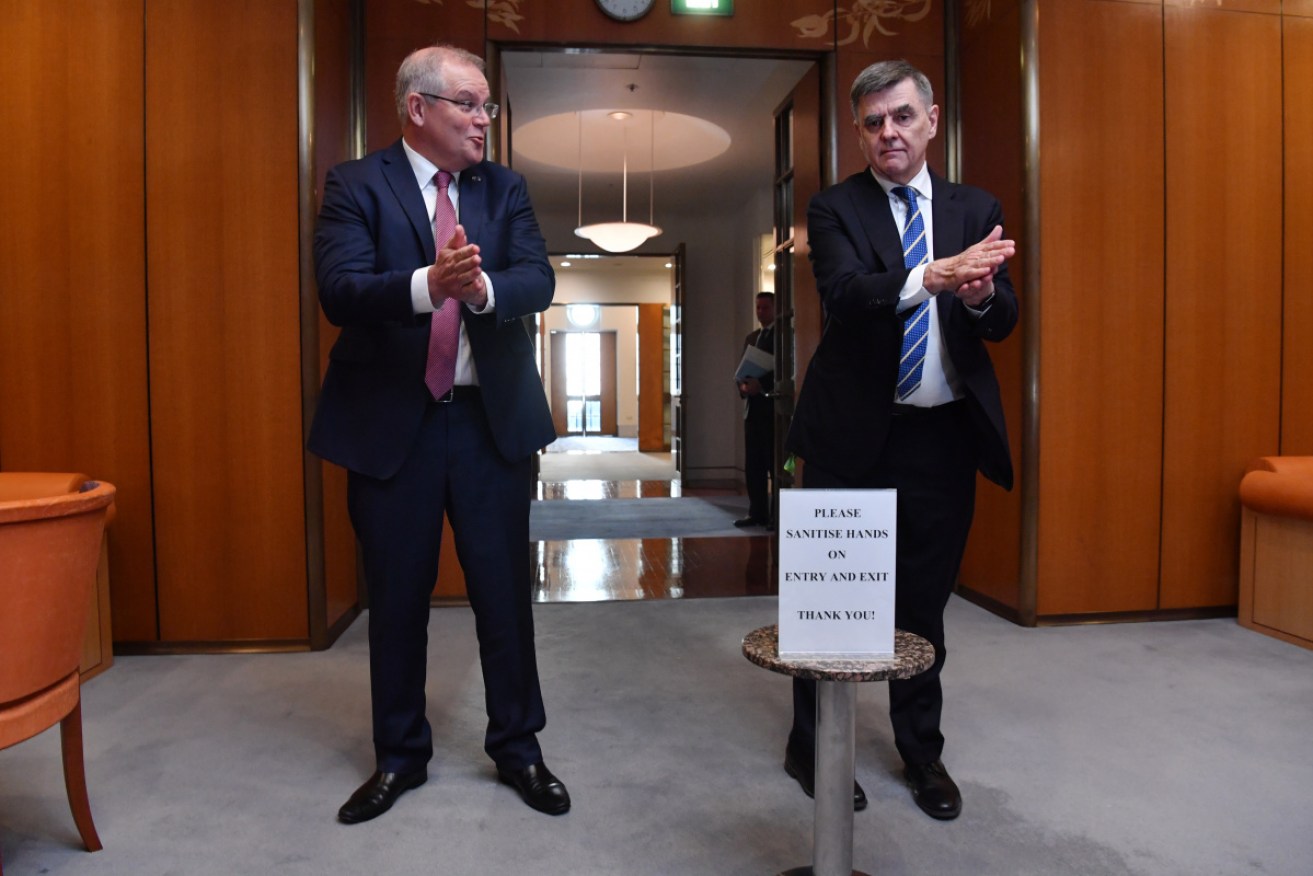Against all advice: The phone call that saved us from a bigger catastrophe


PM Scott Morrison and outgoing Chief Medical Officer Professor Paul Murphy reminding Australians to wash their hands. Photo: Getty
Many people may not realise this, but in the early days of the COVID-19 pandemic the World Health Organisation advised against travel and trade restrictions to countries experiencing outbreaks.
In other words, the WHO was against closing borders as a protective measure against the spread of the virus.
It still maintains that position, and it has its reasons.
But the WHO wasn’t alone.
This week, Sweden’s chief epidemiologist, Anders Tegnell – architect of Sweden’s “trust-based” approach that avoided a lockdown or any other mandated preventative measures – said he was “surprised” that other European Union countries had closed their borders.
Speaking on a Swedish public radio channel, Dr Tegnell said that keeping borders open was a “classic pandemic model” he had been discussing with international colleagues for 20 years.
“It was as if the world went crazy and everything we discussed seemed completely forgotten,” he said, in a widely reported interview. (It should be noted here that Dr Tegnell’s plan resulted in a high death count and no pay-off yet in the form of herd immunity.)
For Australia at least, that purported ‘craziness’ paid off, and very early into the crisis.
- Related: Travellers face crackdown on testing refusal as Victorian cases hit three-month high
- Related: Second wave warning: The nation will suffer if Victoria fails to contain its outbreaks
As outgoing Chief Medical Officer Brendan Murphy revealed, in an exit interview with the ABC, it had become apparent by February 1 that the coronavirus was “spreading significantly outside of Hubei Province and there was widespread transmission in other provinces outside of China.”
On February 3, according to the transcript, Professor Murphy called the Prime Minister: “I said I we need to do what is not normal public health policy. WHO don’t support it. We need to start doing some border measures. We need to stop importation. So we need to close the borders with China.”
Closing borders not policy? Really?
It’s been largely forgotten that in 2009–2010, the world had its first 21st Century pandemic, caused caused by an influenza A(H1N1) virus, also known as swine flu.
According to the WHO, it was “the first pandemic for which many Member States had developed comprehensive pandemic plans describing the public health measures to be taken, aimed at reducing illness and fatalities.
“For the first time, pandemic vaccine was developed, produced and deployed in multiple countries during the first year of the pandemic.”
Closed borders were not part of those plans, despite sharp calls for the border between the USA and Mexico, where the first cases were identified, to be closed.
Republican Senator John McCain in a statement said, “I continue to believe that all available options to end this crisis must remain under consideration, including closing the border if it would prevent further transmission of this deadly virus.”
But the Centers for Disease Control and Prevention (CDC) and WHO took the position that closing borders was not an effective strategy for protecting against an infectious disease.
While most cases of pandemic H1N1 were mild, “globally it is estimated that the 2009 pandemic caused between 100,000 and 400,000 deaths in the first year alone.”
Children and young adults were “disproportionately affected in comparison to seasonal influenza, which causes severe disease mainly in the elderly, persons with chronic conditions and pregnant women.”
This is what apparently frightened people at the time, although the final analysis concluded that pandemic may not have been more lethal than seasonal flu.
Still, it was in some ways a dress rehearsal for what’s happening now.
Things need to change
The UK failed to close its borders. Disaster.
By the time US President Donald Trump closed the border to people from Europe, it was too late. Three days ago, Dr Robert Redfield, director of the federal Centers for Disease Control and Prevention, told Congress that COVID-19 had “brought this nation to its knees”.
Now, people from the US, Brazil and Russia are set to be excluded from travelling to the EU when it re-opens to tourists.
Professor Murphy, who is to become the secretary of the Department of Health, was asked about the WHO’s position against closing borders. He said:
“I think this pandemic has re-written some of the rule books. As I said, WHO said, ‘Never close borders.’ That doesn’t help. Those countries who have done well have closed borders.”
The WHO’s essential position is this: “Travel measures that significantly interfere with international traffic may only be justified at the beginning of an outbreak, as they may allow countries to gain time, even if only a few days, to rapidly implement effective preparedness measures.
“Such restrictions must be based on a careful risk assessment, be proportionate to the public health risk, be short in duration, and be reconsidered regularly as the situation evolves.”
Prime Minister Scott Morrison has called for an investigation into the WHO leadership. More political fall-out is sure to follow. Whether or not the organisation changes its policy, well, WHO knows.








